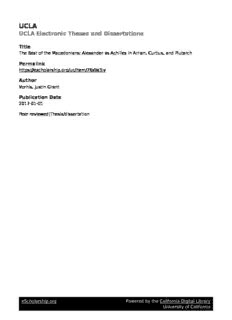
The Best of the Macedonians: Alexander as Achilles in Arrian, Curtius, and Plutarch PDF
Preview The Best of the Macedonians: Alexander as Achilles in Arrian, Curtius, and Plutarch
UCLA UCLA Electronic Theses and Dissertations Title The Best of the Macedonians: Alexander as Achilles in Arrian, Curtius, and Plutarch Permalink https://escholarship.org/uc/item/76s9x3jv Author Vorhis, Justin Grant Publication Date 2017 Peer reviewed|Thesis/dissertation eScholarship.org Powered by the California Digital Library University of California UNIVERSITY OF CALIFORNIA Los Angeles The Best of the Macedonians: Alexander as Achilles in Arrian, Curtius, and Plutarch A dissertation submitted in partial satisfaction of the requirements for the degree Doctor of Philosophy in Classics by Justin Grant Vorhis 2017 © Copyright by Justin Grant Vorhis 2017 ABSTRACT OF THE DISSERTATION The Best of the Macedonians: Alexander as Achilles in Arrian, Curtius, and Plutarch by Justin Grant Vorhis Doctor of Philosophy in Classics University of California, Los Angeles, 2017 Professor Kathryn Anne Morgan, Chair This dissertation concerns the connection between Alexander the Great (356-323 B.C.), the famous Macedonian king, and Achilles, the preeminent Greek hero of the Trojan War. As scholars have long recognized, Alexander’s connection to Achilles represents both a historical and a literary phenomenon: Alexander not only portrayed himself as a second Achilles, but was also portrayed as such by those who wrote about him. While scholars have traditionally concentrated on the connection’s historical dimension, I concentrate in this study on its literary dimension (the Achilles motif), taking Arrian, Curtius, and Plutarch, the three extant Alexander historians with the most developed literary agendas, as the focus of my study. With each historian, I ask two fundamental questions: First, what is the thematic significance of the Achilles motif in the specific passages of each historian’s work in which it appears? Second, what is the thematic significance of the Achilles motif in each historian’s work overall? ii This dissertation consists of three chapters, the first on Curtius’ Historiae Alexandri Magni (Histories of Alexander the Great), the second on Plutarch’s Life of Alexander, and the third on Arrian’s Anabasis of Alexander. In Chapter 1, I argue that Curtius uses the Achilles motif to highlight Alexander’s moral decline over the course of the work, his transformation, in effect, from the good rex (“king”) of the first pentad to the corrupt tyrannus (“tyrant”) of the second. In Chapter 2, I contend that Plutarch employs the Achilles motif, by and large, to characterize Alexander as a “spirited” man (θυμοειδής), as a man of heroism and ambition, but also passion and emotion. In Chapter 3, I argue that Arrian deploys the Achilles motif as a means of reinforcing his complex portrait of Alexander, a portrait simultaneously encomiastic and Stoic. Based on these three chapters, I draw two main conclusions: first, that the Achilles motif represents a remarkably flexibile literary device; and second, that the extant Alexander historians should, in accordance with recent scholarship, be viewed not as mere compilers of the lost Alexander historians, but as sophisticated artists in their own right. iii The dissertation of Justin Grant Vorhis is approved. Robert A. Gurval Alex C. Purves M. Rahim Shayegan Kathryn Anne Morgan, Committee Chair University of California, Los Angeles iv DEDICATION For my dad, who sparked my passion for Alexander all those years ago For my mom, who provided me the love and support with which to pursue this passion and For Celsiana, who has been my best friend and truest partner through the ordeal of graduate school, the Achilles to my Patroclus, the Alexander to my Hephaestion v TABLE OF CONTENTS LIST OF ABBREVIATIONS ...................................................................................................... viii ACKNOWLEDGMENTS ............................................................................................................ xii BIOGRAPHICAL SKETCH ....................................................................................................... xiii INTRODUCTION .......................................................................................................................... 1 The Alexander-Achilles Connection: The Historical Dimension................................. 2 The Alexander-Achilles Connection: The Literary Dimension ................................. 12 Aims and Methodology .............................................................................................. 18 CHAPTER 1 Curtius’ Historiae Alexandri Magni ....................................................................... 25 Introduction ........................................................................................................................... 25 The Punishment of Betis (4.6.26-29).......................................................................... 29 The Marriage of Alexander and Roxane (8.4.22-26) ................................................. 37 The Battle between Alexander and the Indian Rivers (9.4.8-14) ............................... 43 Alexander’s Apologia to the Macedonian Generals (9.6.16-26) ................................ 51 The Diplomatic Exchanges between Alexander and Darius ...................................... 60 i. The First Diplomatic Exchange (4.1.7-14) ..................................................... 63 ii. The Second Diplomatic Exchange (4.5.1-8) ................................................... 69 iii. The Third Diplomatic Exchange (4.11.1-10, 16-21) ...................................... 72 The Death of Statira (4.10.18-24) ............................................................................... 78 Conclusion ............................................................................................................................. 84 CHAPTER 2 Plutarch’s Life of Alexander ................................................................................... 86 Introduction ........................................................................................................................... 86 The Tutelage of Lysimachus (Alex. 5.7-8) ................................................................. 89 The Pilgrimage to Troy (Alex. 15.7-9) ....................................................................... 97 Alexander’s Arming Scene at the Battle of Gaugamela (Alex. 32.8-11) .................. 108 Alexander’s Aristeia at the Mallian Town (Alex. 63.2-10) ...................................... 115 The Death of Hephaestion (Alex. 72.1-5) ................................................................. 128 Conclusion ........................................................................................................................... 137 CHAPTER 3 Arrian’s Anabasis of Alexander ............................................................................ 138 Introduction ......................................................................................................................... 138 The Pilgrimage to Troy (Anab. 1.12.1) .................................................................... 141 vi The Death of Hephaestion (Anab. 7.14.2-8, 16.8) .................................................... 147 The Murder of Cleitus (Anab. 4.9.1-6) ..................................................................... 155 The Mutiny at the Hyphasis (Anab. 5.28) ................................................................ 162 Alexander’s Aristeia at the Mallian Town (Anab. 6.9.2-6) ...................................... 170 Conclusion ........................................................................................................................... 177 CONCLUSION ........................................................................................................................... 179 BIBLIOGRAPHY ....................................................................................................................... 183 vii LIST OF ABBREVIATIONS Primary Sources1 Ael. Aelian V.H. Historical Miscellany Aeschin. Aeschines In Ctes. Against Ctesiphon In Tim. Against Timarchus App. Appian B.Civ. Civil Wars Arr. Arrian Anab. Anabasis of Alexander Ind. Indica Ath. Athenaeus Cic. Cicero Pro Arch. Pro Archia Curt. Curtius Dio Cass. Dio Cassius Dio Chrys. Dio Chrysostom Or. Orations Diod. Diodorus Siculus Dion. Hal. Dionysius of Halicarnassus Ant. Rom. Roman Antiquities Comp. On the Arrangement of Words Eur. Euripides Andr. Andromache Tro. Trojan Women Fg. Sabb. Fragmentum Sabbaiticum Harp. Harpocration Hdt. Herodotus Hom. Homer Il. Iliad Hor. Horace Ars P. Ars poetica Carm. Carmina Ep. Epistulae Isoc. Isocrates Phil. To Philip It. Alex. Itinerarium Alexandri Joseph. Josephus A.J. Jewish Antiquities 1 With Greek works, I give abbreviations in Latin, but titles in English, unless the work is known primarily by its Latin title (e.g., Indica). With Latin works, I give both abbreviations and titles in Latin, except in the case of the Metz Epitome. viii
Description: